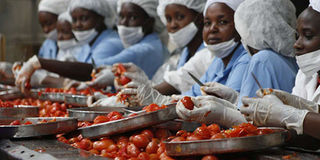JAGUN-DOKUNMU: Why we must ensure our food is safe to eat

Employees sort tomatoes in a jam-making enterprise.FILE PHOTO | NMG
What you need to know:
- With coronavirus, however, has come a vastly heightened public awareness of the importance of good hygiene practices.
- The world is waking up to what the food industry has long known: careful hand washing, consistent cleanliness and care techniques, and yes, even the wearing of gloves and face masks, all help keep infection and disease at bay.
- Food producers know that contaminated food can bring serious financial and reputational ramifications. For consumers, bad food can make them sick, force them into hospital – or even worse.
Make no mistake about it, coronavirus is a devastating health and economic disaster. More than six million people worldwide have been infected and close to 380,000 have died from Covid-19, the disease caused by coronavirus, according to the World Health Organization.
Africa has so far done well to shield itself from the worst of the health crisis, though the numbers continue to rise in many parts of the continent, where healthcare workers are under pressure.
With coronavirus, however, has come a vastly heightened public awareness of the importance of good hygiene practices.
The world is waking up to what the food industry has long known: careful hand washing, consistent cleanliness and care techniques, and yes, even the wearing of gloves and face masks, all help keep infection and disease at bay.
Food producers know that contaminated food can bring serious financial and reputational ramifications. For consumers, bad food can make them sick, force them into hospital – or even worse.
The WHO estimates that food-borne illnesses struck 91 million people in Africa in 2015 and killed 137,000 that year, the highest in the world.
Meanwhile, The Safe Food Imperative, a 2018 World Bank report, estimates that food safety issues cost developing countries a staggering $110 billion in lost productivity and medical treatment in 2016 alone.
With the coronavirus pandemic making us hyper vigilant to what we touch – and eat – food safety has become a hot topic in households, grocery stores and kitchens in Africa and around the world.
The good news is that no reported cases of Covid-19 have been linked to contaminated food. Still, it is always important to maintain good hygiene practices around food to reduce the risk of contamination.
With concerns over hygiene and health on the rise, the second World Food Safety Day, which will be marked on June 7, is assuming much greater significance.
Under the theme ‘Food safety, everyone’s business’, the action-oriented campaign will promote global food safety awareness and call upon countries and decision makers, the private sector, civil society, UN organisations and the public to promote and enforce food safety.
In Africa, Kenya and other countries have made strides in improving food safety, but they would do well to establish independent bodies to help regulate food safety and to bring food legislation in line with international requirements.
For private businesses operating in Africa’s food sector, safety must become a priority.
African consumers also have an important role to play. They must be more vigilant – and settle for nothing less than safe food.
Finally, development organisations such as the World Bank Group can convene leaders and policy makers to pursue improved food safety legislation. They can also help businesses implement and maintain rigorous food safety systems – this is a focus of IFC, a member of the World Bank Group.
Over the past decade, IFC’s food safety programmes have helped clients, including Twiga Foods and others, increase sales by over Sh50 billion ($480 million), helping them solidify their existing client base and reach new markets. IFC has also recently published an updated version of its Food Safety Handbook, which guides food sector companies through the process of establishing or improving food safety systems.
There are many benefits from improved food safety. With safer food, African countries can take a bite out of poverty, improve health outcomes and help their food producers grow and expand their reach.
And to think it all starts with washing hands or covering your mouth and nose when you cough and sneeze.
The writer is International Finance Corporation’s Regional Director for Eastern Africa





